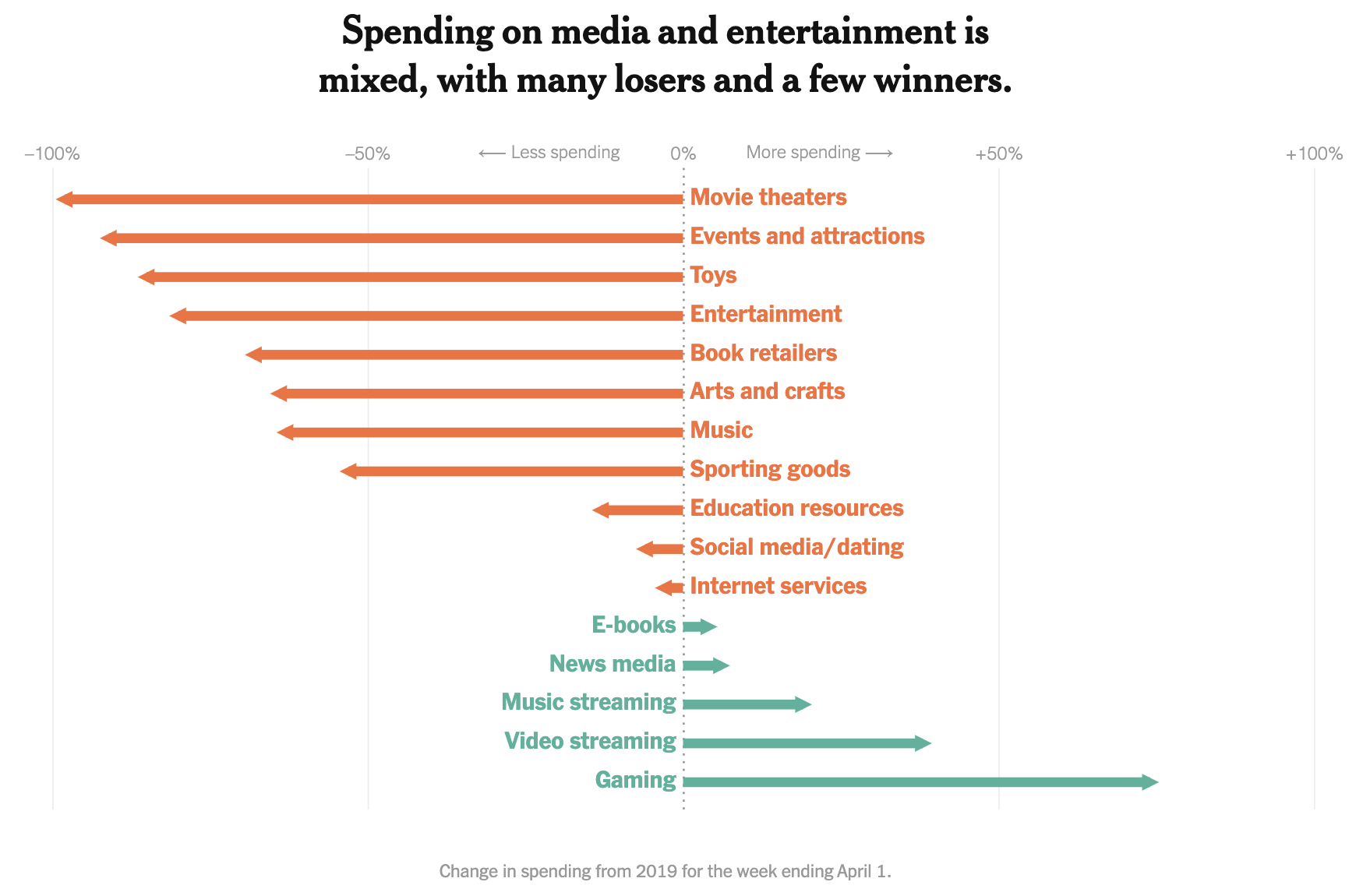Transforming Your Paid Search Campaigns in the Era of COVID-19
Share:
In this phase of social distancing, American consumers are spending most of their time at home. Internet searches and online community involvement have grown exponentially, as consumers adjust to entertaining themselves and working from home.
The economic outlook for the US is unsure at the moment, and we don’t claim to have a crystal ball. But, we also know the businesses that weather this storm will do so through thoughtful digital marketing and by nurturing a dedicated and involved customer base.
Here, we’ll discuss the businesses being hit hardest by our current situation. We’ll look at ways paid search advertising and digital marketing can help your business retain market share, attract new customers, and create a meaningful dialogue between your business and customers during this time to come out ahead on the other side.
The US Industries Affected Most by COVID-19
The novel Coronavirus pandemic is not the first crisis survived by modern businesses, though it is undoubtedly the most significant. Consider how Brexit affected industries on a global scale, and before that, the housing and stock market crash of 2008, as well as the “Great Recession” of 2007 – 2009.
Every organization nationwide has felt the impact of COVID-19. The industries experiencing the most significant downturns are:
- Personal care services – beauty salons, barbers, massage therapists, those businesses that require foot traffic and perform hands-on services.
- Dine-in restaurants – have been ordered to cease dining room gatherings.
- Travel and hospitality – virtually all recreational tourism has ground to a screeching halt.
On the other hand, some industries are experiencing a surge in new internet traffic, new customers, and increased purchases:
- Nonprofits and charities have experienced roughly a 20% increase in both searches performed and donor conversion.
- Healthcare providers and medical device suppliers have experienced at least a 34% increase in searches performed and a conversion improvement around 47%.
- On-demand media and online education platforms have also felt the Coronavirus bump, as home-bound consumers look to entertain themselves and educate their families.

Source: The New York Times
It’s only natural that medical service providers and medical device suppliers experience a tremendous bump in sales. But, what about the businesses that have been ordered to close down? How can a refreshed paid search campaign help these companies weather the storm?
Managing Campaigns During COVID-19
When it comes to ads, it’s essential to make necessary adjustments that are in line with the changing market conditions.
-
- Language & Messaging: Review all words or phrases that are being used in your ad copy. Are they appropriate and mindful of what customers are going through right now? Reconsider using phrases that allude to interacting with others like “get in touch” or “visit us today.” Google Trends is a useful real-time data tool to monitor increases and decreases in search interest and inspire messaging tailored to current events.
- Creative: Avoid using images or videos of crowds of people or other human interaction. Try using media that shows people doing solo activities, video chatting, or try using illustrations or animations.
- Business Information: Double-check that all business operation information is up to date, such as hours of operation. Google now allows businesses to create a COVID-19 post on a Google My Business profile.
Review Automation Performance During COVID-19
- Change Bid Modifiers to People’s Behavior: Search volume, regional search behavior, and device usage have shifted during and are expected to continue to adjust after the crisis. Check and tweak bid modifiers accordingly.
- Watch Dynamic Search Ads & Queries Closely: If the decision is made to remove any crisis-related queries, add them as negatives. Then, make sure to exclude any crisis-related pages from your DSA campaigns.
- Set Up Volatility Alerts: Stay updated in real-time by setting up vital alerts for your accounts that will frequently notify you of significant changes in metrics (i.e. spend triples hour over hour).
- News & Inventory Can Influence Each Other: Prepare for inventory shifts and conversion rate spikes due to certain product categories being featured in the news. Ensure that inventory tracking is optimized and is connected to bid modifications, so no unnecessary spending takes place for orders that cannot be fulfilled.
- Monitor Smart Bidding Algorithms: Analyze performance for the best and worst days to examine if Smart Bidding kept up with the changes and made accurate decisions.
- Creative Approval Delays & Automation Changes: Search engine ad approvals for promotions may be slower than normal due to limited resources. Prepare to adjust automated rules for any upcoming creative replacements (i.e. rules for pausing evergreen ads for promotional ads).
Understanding Changes in Search Behavior and Searcher Intent
Between the work-from-home initiatives, a need for social distancing, and shelter-in-place orders now affecting consumers, internet traffic has exploded. Yet, over the past weeks, savvy internet marketers have noticed a drop in traffic relating to specific keywords that may have been high performers in the past. For instance:
- “restaurants near me” searches may have become “restaurants that deliver” or “take out restaurants.”
- “gyms near me” searches have evolved into “home workout ideas” or “home fitness videos.”
- “hotels in X” searches, and other recreational travel searches, have almost dropped off the radar entirely.
And, perhaps most notable in the current landscape of digital marketing is the massive boost in traffic social media platforms are experiencing, along with gaming platforms and online forums.
Online Communities Explode as Home-bound Consumers Seek Meaningful Social Engagement
Folks are seeking positive relationships and encouragement from new sources. These new online groups and “virtual relationships” created during today’s situation will affect consumer – and employee – behavior in the future.
“Many workplace experts have already noted that the forced shift to working from home will likely alter the way businesses approach their operations, even after the pandemic, while the increased engagement in online groups could make them even more significant, connective elements, and valued tools for support and assistance,” according to Social Media Today.
Looking forward, we need to consider how technology-dependent our new social behaviors will become and apply those concepts to our digital marketing efforts. We can expect that the longer the crisis continues, the more dependent consumers will become on online communities, online education, and product deliveries.
As that shift occurs, even more of our group engagement will shift to digital. It could profoundly alter how people communicate for a very long time into the future.
Adapting to the Future
We are reminded of that old adage, “hindsight is always 20-20.” Of course, recreational travel would drop to nothing during a worldwide pandemic, and of course, a focus on telecommuting would lead to more internet use and increased home-office supply sales. These responses in the market are not surprising. Looking back, these changes in searcher intent are the obvious results of the current situation.
- But, what if you could have predicted these changes sooner?
- What if your organization could have been nearly proactive, rather than reactive, to the changes in keyword performance and the values of social media groups?
- Furthermore, what if your organization had reactive content at the ready?
For instance, what if your fitness center had a library of home workout videos ready to launch, or a platform for your customers already at hand, to encourage community dialogue and involvement?
To put it another way, this is the defining moment for advanced data-based decision-making in digital marketing!
Here at Adlucent, our proprietary Deep Search™ tool allows us to manage paid media across PPC, PLA, Social, and Amazon channels more efficiently than the competition, with bid and feed management, machine learning, testing, reporting, and diagnostics as vital components. We can manage your digital marketing campaigns by integrating additional data points and predict trends in performance before they happen.
Ultimately, the COVID-19 pandemic of 2020 is not the first instance of crisis modern businesses have survived, but it may be the most influential one. If you’re ready to take a new look at digital marketing and PPC, to position your organization for a rapid rebound in a new kind of market, with a strict focus on improving your bottom line, contact Adlucent today.

Victoria Flores
Victoria Flores is a Demand Generation Manager at Adlucent. She has a background in content marketing, SEO, and graphic design. Her passion for creative marketing allows her to develop unique and effective solutions to drive demand. You can find her out on the Texas trails or bouldering when she is not at her desk.
More Resources
Blog Post
January 9, 2025
Blog Post
October 9, 2024
10 Holiday Stats Every Retail Marketer Should Know
Discover 10 essential holiday shopping stats for retail marketers in 2024. Learn how to boost your campaigns with insights on omnichannel strategies, video ads, BNPL, and more."
Blog Post
September 5, 2024
Adlucent Awarded Google Marketing Platform Certified Partner Status, Strengthening Client Solutions
Adlucent, the performance media, analytics, and data agency that recently joined forces with BarkleyOKRP, is officially a Google Marketing Platform (GMP) Certified Partner for Display & Video 360 (DV360), Campaign Manager 360 (CM360), and Search Ads 360 (SA360).